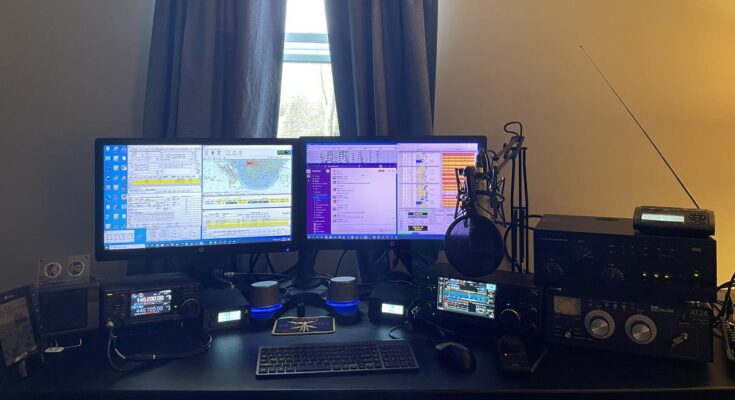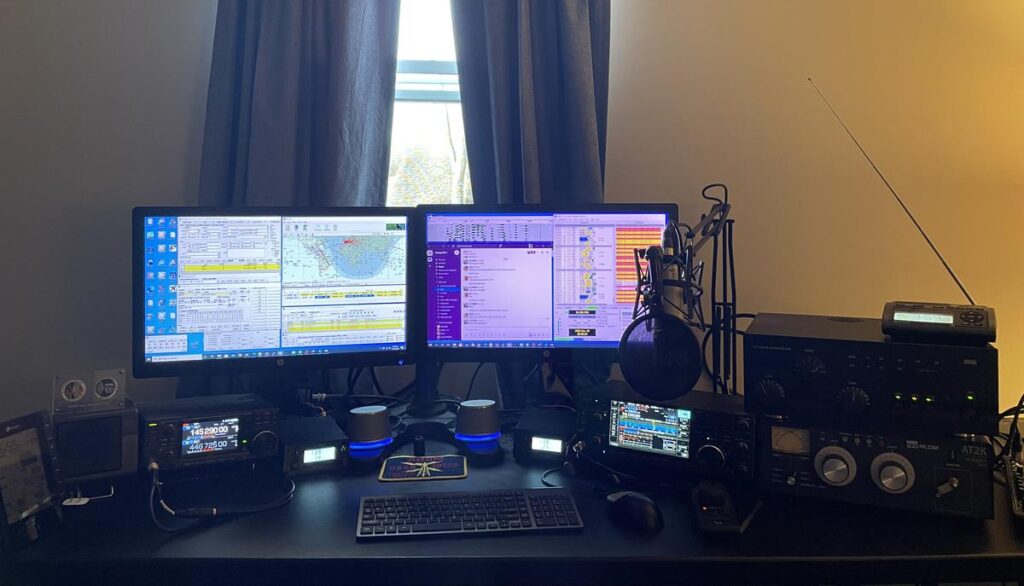Winter blues coming around? Luckily we’re in the thick of contest season to go along with being stuck at home while everything is closed. The past two weekends have hosted the ARRL 160 Meter Contest, FT-Roundup, and the ARRL 10 Meter contest.
I used both of these contests as an opportunity to work on my truly nascent code skills. Contests are a good way to work on your receiving code proficiency as you have a lot of stations on the air, you have repetitive exchanges that you’ll hear again and again and can make mental associations with, and most of the folks are forcing you to copy it fast. These contests not great opportunities for practicing sending code as you’ll likely want to use macros and/or a keyboard so that you’re not causing a bottleneck for the other stations trying to work the station you are calling.
ARRL 160 Meter Contest. This contest was fun for me. In my previous QTH I simply didn’t have the room to put up anything that I could use on 160m. (Ok, not entirely true – I did try loading up the gutter system on the building once and while it actually was a 50 ohm match, it was not an effective antenna.) I still would be better suited by a longer antenna, but honestly I can’t complain. In the winter months when it is quiet, 160 is a great band. (But if you’re new to 160 and running barefoot with a compromise antenna, don’t be surprised if some of those stations 20 over have trouble hearing you – routine users of the band often have dedicated 160m antennas and are running QRO.) I wasn’t sure how my 135ft ladder line fed doublet was going to do as it is better suited for 80m but it worked out better than I expected. In a 4 hour period I worked 114 stations in 44 sections. I did not work any DX. (I spent the rest of the weekend on the FT Roundup contest, so I only operated between 20:00 and 23:59 ET on Friday 12/4/20.)
ARRL 10 Meter Contest. One thing contesters quickly realize is that for mixed-mode contests, there’s usually a lot more activity on CW than on phone. In most of these contests, CW contacts are worth more points. Additionally, the narrow properties of CW allows the ear to decode it at a much lower signal to noise ratio than human speech. In other words, you’ve got a better chance of hearing the weak ones and getting more points for them. Since I was using the contests as an exercise to focus on listening to code, that was fine with me.
While we’re not at the bottom of the sunspot cycle anymore, the upper bands still are not great. The contest started off with surprisingly good band conditions on Friday night. I chatted briefly with KW8N when I worked him and he summed it up well, “I was just going to screw around for a little bit but band conditions are so good.” Unfortunately, that didn’t continue for Saturday. Saturday morning was marginal and conditions only deteriorated from that through the rest of the day. A surprise highlight was working Namibia on phone at 9am ET on Saturday. Sunday was a better day with fairly decent conditions from the morning until late afternoon. Every time I’d think about packing it in on Sunday afternoon, the band would shift slightly and open up to other states I hadn’t worked so that kept me coming back every hour or so to check. There were no great DX openings, no wet a rope and throw it out the window and work the world moments, but still a lot of stations on the air and having fun in what was primarily a stateside contest. NQ8O also got into the action for a couple hours Sunday handing out some Qs.
Results:
AB8M – Single Op, Mixed Mode, Assisted, High Power. Score: 21,756. 108 CW QSOs, 43 SSB QSOs
NQ8O – Single Op, CW Only, Assisted, High Power. Score: 9960. 83 CW QSOs.
73 de AB8M, Doug

